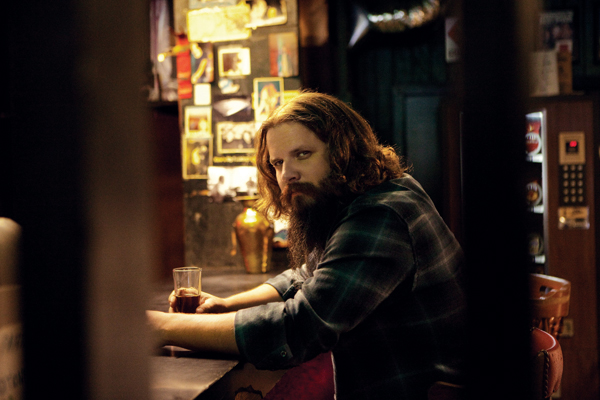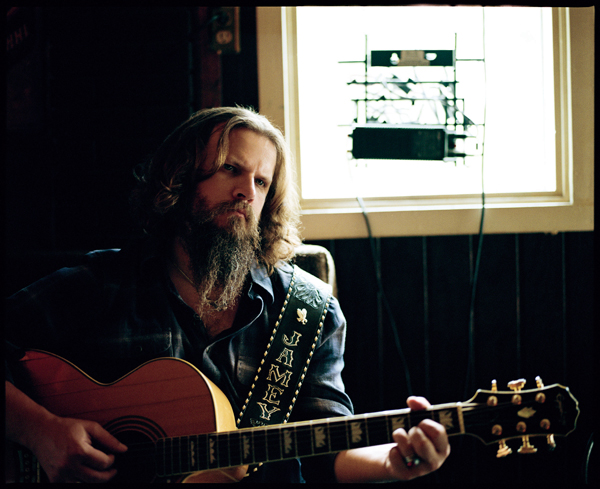Videos by American Songwriter
Jamey Johnson is playing his first song of the night, “High Cost of Living,” at a sold-out show in Glasgow, Kentucky. The words are about trading his good life for “cocaine and a whore.” The song wasn’t much of a country hit, for obvious reasons, but the crowd knows every word. He’s wearing a black T-shirt, blue jeans and a backwards ball cap. His beard hangs nearly to his chest, his ponytail falls between his shoulder blades and he doesn’t look that much different than several of the men in his audience.
At the end of the song, he greets the audience by raising his red Dixie cup and the crowd roars. Then the room settles down for two new songs – which will turn out to be the first tracks on his double album, The Guitar Song – and everybody listens intently. Johnson doesn’t talk much between songs, if at all, but in those in-between moments, the historic theater is punctuated with hollers of approval and shouts of “Sing it, Jamey!” It’s like the rowdiest songwriter night you’ve ever been to.
During an interview about a week before the concert, Johnson, 35, is asked what he’d like his audience to take away from his live shows. “Man, I’m just usually hoping they can get home OK,” he replies with a laugh. “We get done with our show and sometimes we’ve played for four-and-a-half or five hours. But by the time they leave there, I know how I feel – and I’m hoping they’ve got a ride, too.”
The Guitar Song is a double-album that melds his own material with a handful of country gold tunes from Nashville songwriters who inspired him, like Kris Kristofferson and Mel Tillis. One side is labeled “Black Album,” and the other, “White Album.” The easy description is to say that one half is dark, while the other half is… well, not so dark. But there’s more to the story.
“The ‘Black Album’ is a path that leads to a very cold place. And the ‘White Album’ is an equal amount of redemption and deliverance from that cold place. Each song colors over another whole area,” he explains. “It’s kind of a tale that starts in one place, and if you follow all the way through and see where it ends up, you kind of gather what happened. These decisions that were made or events that happened kind of mold your reaction to other events that happened.”
He starts the “Black Album” with “Lonely at the Top,” an undiscovered song written by Don Cook, Chick Raines and country star Keith Whitley in 1988. The lyrics find a newly minted country star lamenting that fame and fortune are oh so hard. When the singer offers to buy the stranger on the next barstool a drink, the other guy agrees to a double, then wryly responds: “It might be lonely at the top / But it’s a bitch at the bottom.” Johnson considers the twangy tune as “a nugget of wisdom from an old honky-tonker to a new one.”
That’s followed by an intense break-up ballad, “Cover Your Eyes,” which Johnson co-wrote with Wayd Battle and Bobby Bare, the iconic “old honky-tonker” famous for his Grammy-winning single, “Detroit City.” After that, “Poor Man’s Blues” – which Johnson wrote alone – is about taking revenge on a conceited rich man who crosses a “low-class, backwoods, country boy from Deep South Alabam’.” Johnson’s intimidating baritone personifies the bad guy pretty damn well.
Born and raised outside Montgomery, Alabama, Johnson shared the same stomping grounds as Hank Williams. (The legend gets name-checked in Johnson’s cover of Vern Gosdin’s 1988 hit, “Set ‘Em Up Joe.”) “My dad was a big Hank Williams fan, to the point where I had never really heard Hank’s voice on those songs. My dad was the one who sang those. He’d break out a guitar and teach me some songs that he liked. I remember the first time I heard Hank Williams sing, I thought it sounded weird,” Johnson recalls with a laugh. “They were all real big Hank Williams fans and still are.”
His father’s advice takes a starring role in “Seat Of Your Pants,” the first track on the “White Album.” The lyrics list the life lessons that Johnson learned as a young man, ranging from fish bait to romance. He sings it from an honest, hard-won perspective: “Sometimes that woman of your dreams / Can be little bit too real / Sometimes you gotta go to work / No matter how you feel.”
“If you’re not writing from the perspective of everything in your life, then you’re cheating yourself and you’re cheating your listeners,” says Johnson, whose parents divorced when he was in his late twenties. “I’ll draw on all kinds of experiences – and definitely parents. That’s not just for country music. That’s for any writer. Some writers had rough childhoods. Hell, if you can get that stuff out, you’d be surprised. It’s like therapy – not just for your listener, but for the writer as well. You’re pulling out some stuff you really didn’t know you felt about anything. You sit there and once you get in the middle of it, I’ve been surprised about the kind of stuff I’ve written about. Certain topics –stuff that I’ve never shared with anybody. But I’m glad I wrote it. And it made me aware of something that maybe I didn’t think of before I started writing.”
Meanwhile, back on the “Black Album,” Johnson wrote “Baby Don’t Cry” for his very young daughter. Although Johnson is certainly the scruffiest country singer on the charts, he shows a more sensitive side by soothing a scared child with reassuring images of fairy tales, castles and princesses.









Leave a Reply
Only members can comment. Become a member. Already a member? Log in.